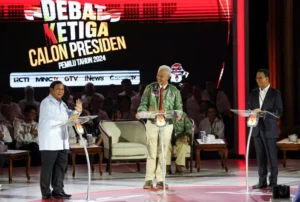As Indonesia approaches its presidential election on February 14, the debate intensifies. Vice-presidential candidates critiqued President Jokowi’s nickel strategy during a televised discussion.
This debate, part of a series, focused on sustainable development and natural resources. Candidates are aligned with Prabowo Subianto, Ganjar Pranowo, and Anies Baswedan.
Jokowi’s policy, aimed at enhancing domestic nickel processing, has seen a rise in smelters. Many are backed by Chinese investments. Yet, environmental and safety concerns have emerged, especially after a deadly smelter explosion in Sulawesi.
Muhaimin Iskandar pointed out the environmental damage and dominance of foreign workers.
Gibran Rakabuming defended the policy, emphasizing its potential for economic growth and job creation. He highlighted the importance of considering environmental and social impacts.

Critics argue the policy favors foreign companies over local welfare. They also highlight issues like deforestation and illegal mining.
The upcoming election will decide the direction of Indonesia’s nickel policy and its economic strategies. This policy is central to Indonesia’s role in the global shift towards electric vehicles.
Background
Indonesia’s nickel policy reflects a global trend towards securing raw materials for green technologies.
The country’s vast nickel reserves have positioned it as a key player in the electric vehicle (EV) battery supply chain.
This strategic move aligns with worldwide efforts to transition to cleaner energy sources.
However, it also places Indonesia at the center of debates on sustainable mining practices and the balance between economic development and environmental protection.
Comparatively, other countries with significant mineral resources face similar challenges, striving to attract investment while ensuring responsible extraction practices.
Indonesia’s approach to nickel downstreaming serves as a benchmark for nations looking to leverage their natural resources for economic growth.
As the global demand for EVs and renewable energy solutions rises, the policies and practices adopted by Indonesia will likely influence international standards for mineral processing and trade.
The outcome of the upcoming election will thus not only shape Indonesia’s future but also contribute to setting precedents in the geopolitics of green technology and sustainable development.

